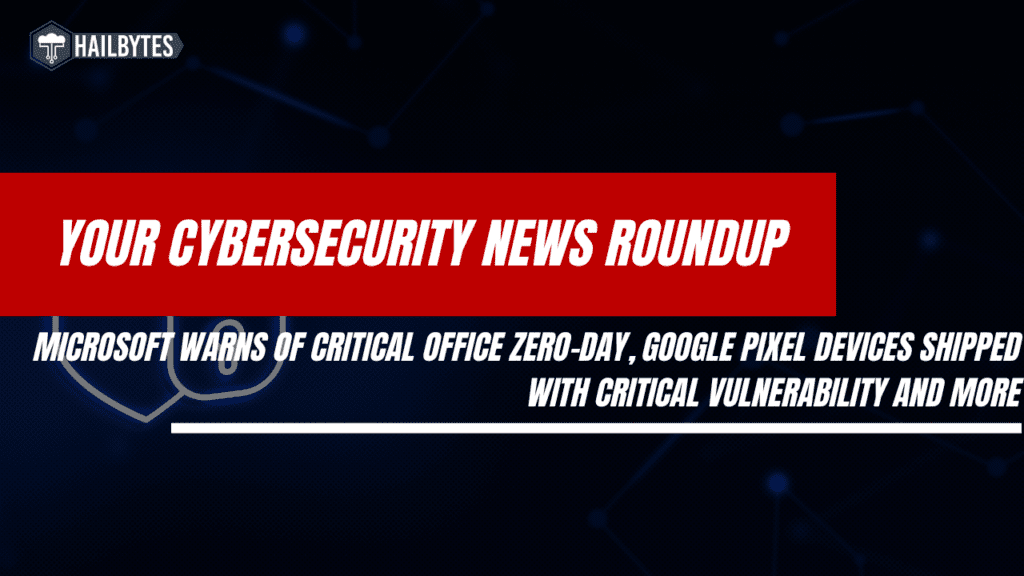Microsoft Warns of Critical Office Zero-Day, Google Pixel Devices Shipped with Critical Vulnerability: Your Cybersecurity Roundup

Microsoft Warns of Critical Office Zero-Day
Microsoft has sounded the alarm over a critical vulnerability in its Office software suite that could potentially allow attackers to steal sensitive information. The zero-day flaw, designated CVE-2024-38200, affects multiple versions of Office, including widely used iterations like Office 2016, Office LTSC 2021, Microsoft 365 Apps for Enterprise, and Office 2019.
Exploiting this vulnerability could enable malicious actors to craft specially designed files that, when opened by unsuspecting users, would grant unauthorized access to sensitive data. While Microsoft has already implemented a temporary fix and is preparing a comprehensive patch for release on August 13th, the company emphasizes the importance of updating Office software as soon as possible.
The vulnerability highlights the ongoing challenges organizations face in maintaining robust cybersecurity defenses, as attackers continually seek new ways to compromise systems.
Ransomware Gang Leverages Exposed .env Files for Massive Attack
A sophisticated ransomware gang has successfully extorted multiple organizations by exploiting publicly accessible .env files containing sensitive credentials. The attackers capitalized on a series of security missteps, including the exposure of environment variables, the use of long-lived credentials, and inadequate privilege management.
By infiltrating victims’ AWS environments, the threat actors launched a massive scanning operation targeting over 230 million domains and compromising thousands of .env files. These files contained valuable credentials for cloud services and social media accounts, providing the attackers with a foothold to steal sensitive data and demand ransom payments.
The campaign’s success highlights the critical importance of robust security practices, including protecting sensitive information and implementing strong access controls. Organizations must prioritize safeguarding .env files and other configuration files to prevent unauthorized access.
Google Pixel Devices Shipped with Critical Vulnerability
A significant security flaw has been discovered in a pre-installed app on millions of Google Pixel devices. The app, “Showcase.apk,” designed for Verizon store demos, has been found to contain vulnerabilities that could potentially allow attackers to remotely execute code and install malware.
The issue stems from the app’s excessive system privileges and its reliance on unsecured HTTP connections for downloading configuration files. This combination creates a pathway for malicious actors to intercept and modify the configuration file, potentially compromising the device.
While there’s no evidence of the vulnerability being exploited in the wild, the potential consequences are severe. The flaw could allow attackers to gain control of the device, steal sensitive data, or install spyware.
Google has acknowledged the issue and is working to remove the app from all supported Pixel devices. However, the discovery highlights the importance of thorough security assessments, even for pre-installed software.
FBI Disrupts Operations of Emerging Ransomware Group, Radar/Dispossessor
In a significant victory against cybercrime, the Federal Bureau of Investigation (FBI) has announced the disruption of critical online infrastructure belonging to the nascent ransomware group, Radar/Dispossessor. This takedown serves as a positive development in the relentless fight to curb the global ransomware threat.
Radar/Dispossessor, believed to be led by the online persona “Brain,” emerged in August 2023 and rapidly established itself as a threat to small and mid-sized businesses (SMBs) across various sectors worldwide. The group employed the now-common “double extortion” tactic, encrypting victim data and threatening to release it publicly unless a ransom demand was met. Investigations suggest potential links between Radar/Dispossessor and former members of the notorious LockBit ransomware gang.
The FBI’s operation successfully seized control of servers located in the United States, United Kingdom, and Germany that were crucial to the group’s operations. Additionally, eight criminal domains registered in the US and one in Germany associated with Radar/Dispossessor were disabled.
This takedown underscores the growing international cooperation between law enforcement agencies in combating ransomware. The FBI’s success reflects a broader trend of increased collaboration and resource sharing aimed at disrupting ransomware activities. However, the fight against cybercrime remains complex and constantly evolving.






 reNgine Reconnaissance
reNgine Reconnaissance GoPhish Phishing Simulation
GoPhish Phishing Simulation  VPN Solutions
VPN Solutions ShadowSocks SOCKS5 Proxy
ShadowSocks SOCKS5 Proxy Vulnerability Calculator
Vulnerability Calculator  NEW
NEW Implementation Services
Implementation Services

 Documentation Hub
Documentation Hub Security Guides
Security Guides Free Security Tools
Free Security Tools Compliance Templates
Compliance Templates Training Videos
Training Videos Security FAQ
Security FAQ